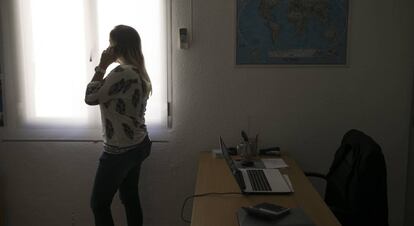More work but less money: Spain¡¯s new salary trap
As economy recovers, job creation is up, but many positions are temporary and part-time
Before the crisis, €1,000 a month was considered a low salary. These days, it is it an unattainable goal for many workers in Spain. ¡°It¡¯s very hard to make ends meet on €800 a month,¡± admitted Juan Rosell, president of the CEOE employers¡¯ association, in a radio interview a week ago.

Yet reality shows that there are a lot of people in that situation. Deliane, a 29-year-old from Brazil, is one of them: she earns around €700 a month working two part-time jobs Monday through Friday: she walks a dog for two hours and babysits a seven-year-old child for three-and-a-half hours.
¡°I share an apartment and really watch what I spend. That¡¯s how I make it to the end of the month,¡± explains Deliane, who has a law degree. Deliane is an assumed name: she would rather not use her real name to avoid getting into trouble with her employers.
Four out of 10 workers in Spain earned under €1,297.20 a month in 2015, according to figures released by the National Statistics Institute (INE). And 12.62% of workers took home the minimum wage, set at €648.60 a month, or even less if theirs was part-time work.
There are fewer and fewer employees with average salaries and more and more workers on low wages
Marcel Jansen, Madrid Autonomous University
And increasingly, part-time work is the only way out for many. Silvia Ruiz, 32, works at a hair salon for half a working day and makes €510 a month. She would like to find a full-time job, but has not managed it yet.
The Spanish economy is creating jobs: registered unemployment fell by 98,317 people in June, while there were 87,692 new contributors to Social Security, according to the Labor Ministry. But the quality of the jobs is under scrutiny.
¡°The economic recovery is based on temporary and part-time jobs. This leads to an increasingly accentuated salary devaluation,¡± notes Jos¨¦ Ignacio P¨¦rez Infante, of the Association of Economists Against the Crisis (EFC).
The INE figures confirm this increase in part-time work. ¡°The distribution of worker salaries is becoming polarized. There are fewer and fewer employees with average salaries and more and more workers on low wages,¡± says Marcel Jansen, who teaches at the Autonomous University of Madrid¡¯s School of Economics.
I share an apartment and really watch what I spend. That¡¯s how I make it to the end of the month
Deliane, 29-year-old Brazilian
The INE statistics draw from data collected by the Spanish Tax Agency and Social Security, and thus reflect declared income. They do not include any earnings from the underground economy.
In 2015, the average gross salary rose 1.1% to €23,106 a year, but that was thanks to workers 40 and over. Younger workers remain trapped in a spiral of falling wages. Among those under 24, earnings from work fell an average 5.1% to €11,228 a year; for those between 24 and 29 years of age, they fell 1.6% to €16,064; and those between 30 and 34 took home 3% less, or €19,597.
The lowest earners in Spain, according to the statistics, are typically young, foreign, unskilled women working in the hospitality industry on temporary contracts. Deliane, the Brazilian dog-walker and babysitter, checks nearly all the boxes ¨C except in her case, she has higher education. But even that is not enough to escape the low salaries in Spain.
But Deliane is also studying for a master¡¯s degree in human rights at Madrid¡¯s Complutense University, which she hopes will open more doors to her. ¡°In my area of expertise, all you can find are unpaid internships,¡± she says with a sigh.
English version by Susana Urra.
Tu suscripci¨®n se est¨¢ usando en otro dispositivo
?Quieres a?adir otro usuario a tu suscripci¨®n?
Si contin¨²as leyendo en este dispositivo, no se podr¨¢ leer en el otro.
FlechaTu suscripci¨®n se est¨¢ usando en otro dispositivo y solo puedes acceder a EL PA?S desde un dispositivo a la vez.
Si quieres compartir tu cuenta, cambia tu suscripci¨®n a la modalidad Premium, as¨ª podr¨¢s a?adir otro usuario. Cada uno acceder¨¢ con su propia cuenta de email, lo que os permitir¨¢ personalizar vuestra experiencia en EL PA?S.
?Tienes una suscripci¨®n de empresa? Accede aqu¨ª para contratar m¨¢s cuentas.
En el caso de no saber qui¨¦n est¨¢ usando tu cuenta, te recomendamos cambiar tu contrase?a aqu¨ª.
Si decides continuar compartiendo tu cuenta, este mensaje se mostrar¨¢ en tu dispositivo y en el de la otra persona que est¨¢ usando tu cuenta de forma indefinida, afectando a tu experiencia de lectura. Puedes consultar aqu¨ª los t¨¦rminos y condiciones de la suscripci¨®n digital.











































